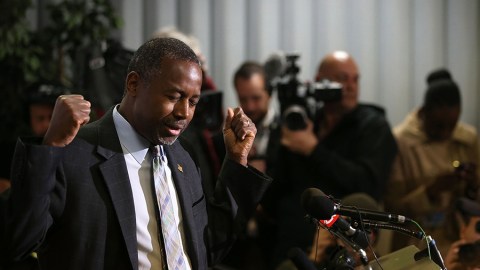Should Religion Matter in Politics?

Donald Trump is not the only person surprised by Ben Carson’s recent surge in national polls, which has propelled the former neurosurgeon into first place in the GOP race. In an election year poised to champion an “outsider,” Carson’s seemingly calm collectedness sounds like a breath of fresh air to Trump’s erratic tirade of complaints and boasts.
Underneath Carson’s cool façade resides an apocalyptic fervor, however. While it comes out sedated and matter-of-factly, his philosophy is informed by his faith: Seventh-Day Adventism was founded on the notion of a pending End Times. Such musings have trickled out during Carson’s speeches, raising more than one inquisitive ear.
Separating religion from politics is as fanciful a notion as removing church from state. As a nation, we have accomplished a great deal relative to certain nations, yet to others it’s laughable how deeply woven religious sentiments are in our politics. Given the outright religiosity of crusades against same-sex marriage and abortion rights, we have to question if we can ever truly separate our religious philosophy with our moral and political ones.
You can understand religion without necessarily believing in it, which is important if you want to wrap your head around what’s going on in our country (and world) today. But education has been stripped from our religions…
As religion professor Stephen Prothero argues in Religious Literacy, America is an exceedingly religious nation in terms of belief, yet sadly lacking in terms of religious education. Forget about knowing much about other religions; it seems that Americans know very little about our own traditions. As he writes:
He also reiterates the fact that many Americans believe sharia law is one of the Five Pillars of Islam, which it is not. This is not surprising, considering most Americans cannot name even one pillar.
That’s his point: You can understand religion without necessarily believing in it, which is important if you want to wrap your head around what’s going on in our country (and world) today. But education has been stripped from our religions; as Prothero points out, market research has shown that Christians are turned off by actual religious teachings. Churches have become mini-malls with daycare and shopping, along with stand-up comedians and musical acts taking the place of scriptural quotes on billboards. Megachurches become mega when preaching prosperity theology, not doctrinal lessons.
Prothero explores three main types of Christians: confessionalists, who focus on doctrine; experientialists, who emphasize connecting with God via emotions; and moralists, who focus on ethics. While most religious are a mix of these three, the social emphasis in recent years has been on the latter (hence, opposition to same-sex marriage and female reproductive rights).
For most of its history, Seventh-Day Adventism was considered by the larger Protestant community to be a cult, a fate it shared alongside Christian Science, Mormonism, Pentecostalism and the Jehovah’s Witnesses.
This goes all the way to the top: Every American president has sworn an affiliation to Jesus in some capacity; less than half of Americans claim they would vote an atheist into office; a majority of Congress is influenced in some manner by their religion. While some may be less forthcoming, Carson proudly wears his religiosity. So the question remains: What is Seventh-Day Adventism?
An offshoot of Protestantism, it was founded by a Baptist preacher from Massachusetts named William Miller, who, on the basis of a reading from Daniel, guessed that Christ’s Second Coming was going down on October 22, 1844. His followers, the Millerites, were profoundly disappointed in their sage’s mathematical miscalculation, but they were certain that his general belief in Christ’s return being imminent was correct. A ministry run by Ellen G. White and her husband James White picked up the pieces and founded the Seventh-Day Adventist Church.
For most of its history, Seventh-Day Adventism was considered by the larger Protestant community to be a cult, a fate it shared alongside Christian Science, Mormonism, Pentecostalism and the Jehovah’s Witnesses. Dominant religious groups are slow to allow “deviant” groups into the mainstream. By the middle of last century, Adventists craved a larger base, striking up conversations with Protestant leaders — a move that promoted them from cult status to acceptance under the larger umbrella of Protestantism.
Adventists rely on their churches “28 Fundamental Beliefs,” which include:
God’s law is embodied in the 10 commandments.
The Sabbath should be observed from Friday sunset to Saturday sunset (hence, the “seventh day” moniker).
The wicked will not suffer in hell, but be permanently destroyed.
In 1844, Jesus began to cleanse the “heavenly sanctuary” in preparation for his return — a head nod (or apology?) to Miller.
A literal belief that God created the Earth 6,000 years ago — the modern “Creation Science” movement was kicked off by Adventist George McCready Price.
Prothero makes a controversial request in his excellent book: Religious education should be more widespread in American schools. I agree. Having earned a degree in religion nearly two decades ago, it has proven useful in understanding how our society is operating on a fundamental level. Simple misunderstandings can be avoided, such as: How did 9/11 happen? (Because it’s been happening for 14 centuries, with varying guilty parties.) Or: Christ and Buddha taught the same thing. (No, they didn’t; not even close.)
Prothero goes to lengths to remind readers that he does not mean religious indoctrination, yet people get the two confused. The reality is we all use our beliefs in our decision-making, some more rationally than others. Carson believes the world was created 6,000 years ago and Christ’s return is imminent. In his hushed tone resides an End Times foundation that is over 170 years old. Knowing where he’s coming from is crucial in understanding how he’d lead if chosen.
—
Image: Justin Sullivan / Getty Images





